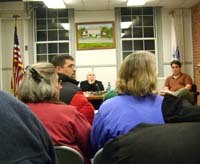Clarksburg Gives OK to Gravel Operation
 |
| Michael Milazzo, left, responds to a neighbor at the Clarksburg Town Hall. |
The permit came attached with a list of negotiated conditions addressing hours, operations, noise, a property survey and importation of materials. The gravel bank is situated on about 12 acres at the top of Easy Street, a private way off North Houghton.
D&M Industries had filed suit against the Selectmen and Conservation Commission late in 2006 after the permit was issued with a laundry list of conditions that D&M partner Michael Milazzo said at the time was too restrictive for the business to operate.
The case did not make it to trial; instead, both sides negotiated the agreement that was aired at the public hearing for the permit on Wednesday. Selectmen Chairwoman Debra LeFave said afterwards that it was not in the town's financial interest to fight the lawsuit.
"I'm glad that we've finally come to terms with the town and that it's all over," said Milazzo, whose father, Anthony Milazzo, owns the property, which includes the Mountain View Restaurant. Kevin Dodge, who had planned to partner with Milazzo in the gravel bank, has withdrawn from the picture.
Milazzo said there are plans for Guntlow & Associates to survey the property with the idea of eventually subdividing the property of housing.
In contrast to earlier hearings that drew large crowds of angry abutters, only about a half-dozen attended Wednesday's hearing. Town Administrator Michael Canales said 39 letters had been mailed informing neighbors of the hearing.
Those who did appear were concerned with noise, traffic and air-borne particles caused by the gravel screening process.
The operation is required to keep noise levels at 10 decibels above the normal noise quotient, but North Houghton Street resident Neil Mcleod wanted to know what that meant. "What is 10 decibels? Do we know what that is?"
"Normal residential ambient decibel [noise] ranges from like 20 to 30, or 40 depending on traffic noise," said Milazzo's attorney, Elisabeth Goodman of Ware & Goodman of Williamstown. She gave the example that airplanes flying low over airports cannot exceed 65 decibels. "So it's not going to interfere with your normal inside activities in your house. It's just not."
Milazzo said an engineer would have to measure the ambient, or background noise, on the property to determine the noise-level restrictions.
"It answers my question very very well but I least I have some idea," said Mcleod.
Jeff Bona of North Eagle Street wanted to know what precautions were going to be taken for dust. Milazzo responded that the operation would have conform to state air quality regulations.
But Bona was concerned that the number of heavy gravel trucks driving up and down Houghton Street would damage the road and old sewer and water lines. Milazzo and others said heavy trucks run up and down that street regularly, including tractor trailer trucks, heating oil trucks and other construction company vehicles.
Mcleod, however, said Bona had a point because road changes could affect homeowners. The widening of the road some years ago had affected the spring that fed his well, leaving him without water, he said. "What happens if we have several breaks? ... What happens if we have consistent, heavy traffic?"
Canales said there is a mechanism in place to fix the lines - North Adams sends an engineer to oversee the work and the town does the labor.
Goodman said the permit could not be linked to vehicle weight because the state regulates roads and weights.
"If we were to set a weight limit we would have to stop every truck and put it on a scale," said Selectman Carl McKinney. "It is a public way. It's not practical."
The hours of operation had been a sticking point with the Selectmen. The board had wanted 9 to 3 weekdays; Milazzo had asked for 7 to 5 weekdays and 7 to noon Saturdays. The agreement is 8 to 4 weekdays.
The board approved the permit unanimously. Milazzo will still have to return to the town with a site plan survey indicating wet lands; the town will then hire its own engineer at Milazzo's cost to review the plan.
But the agreement isn't enough to please all the abutters. Mcleod has lived in his home since 1988, now he's planning on selling.
"I had hoped to retire here," he said. "But I don't want to live with a gravel bank behind me."















